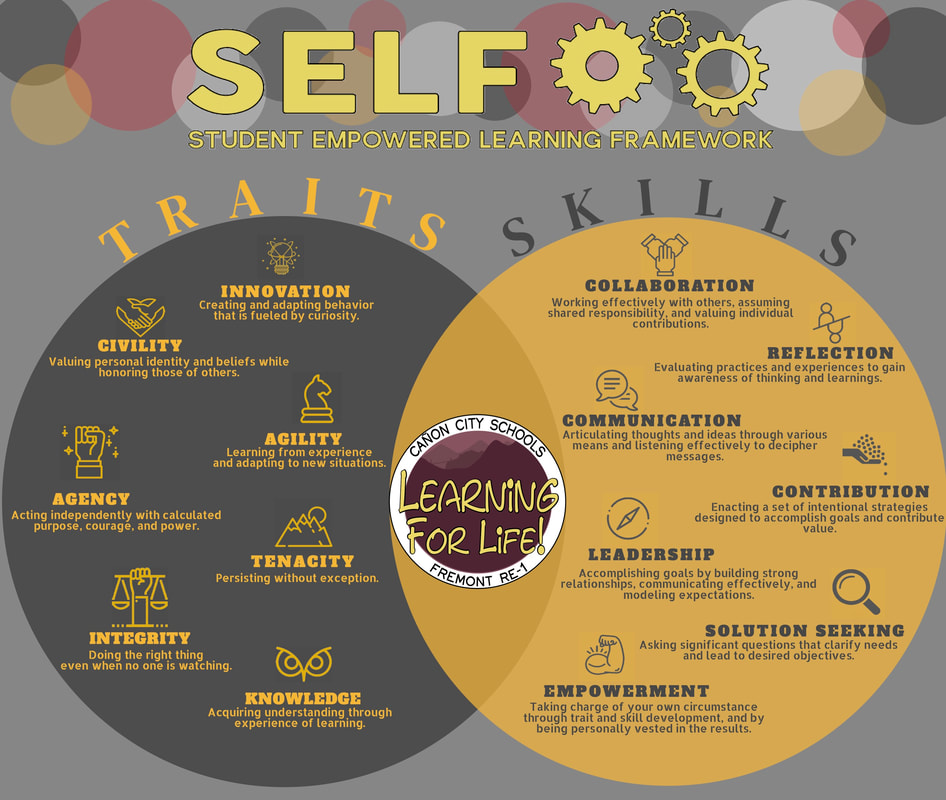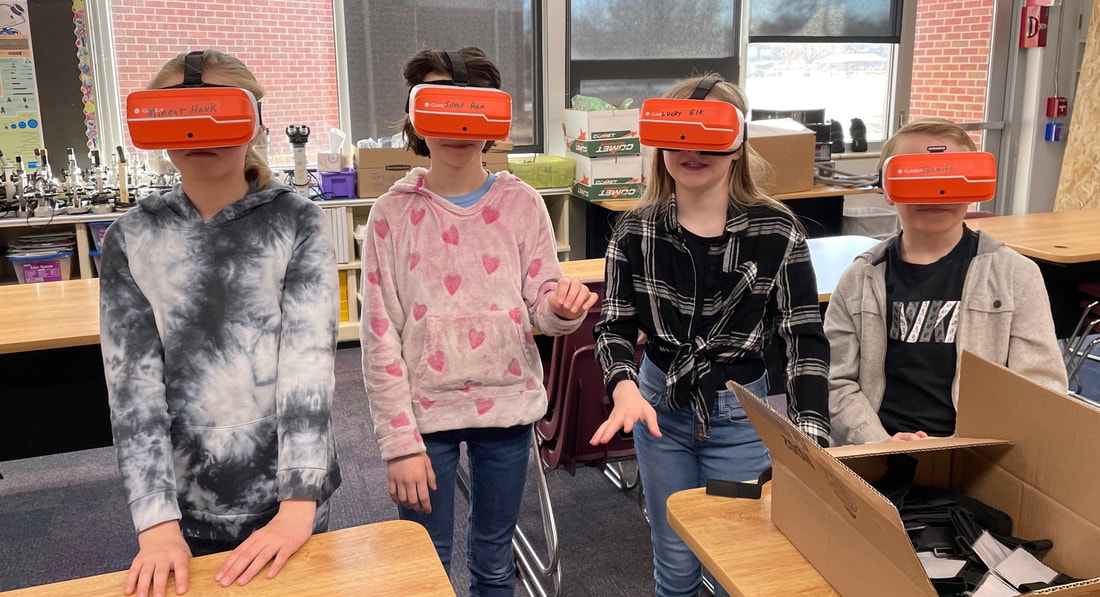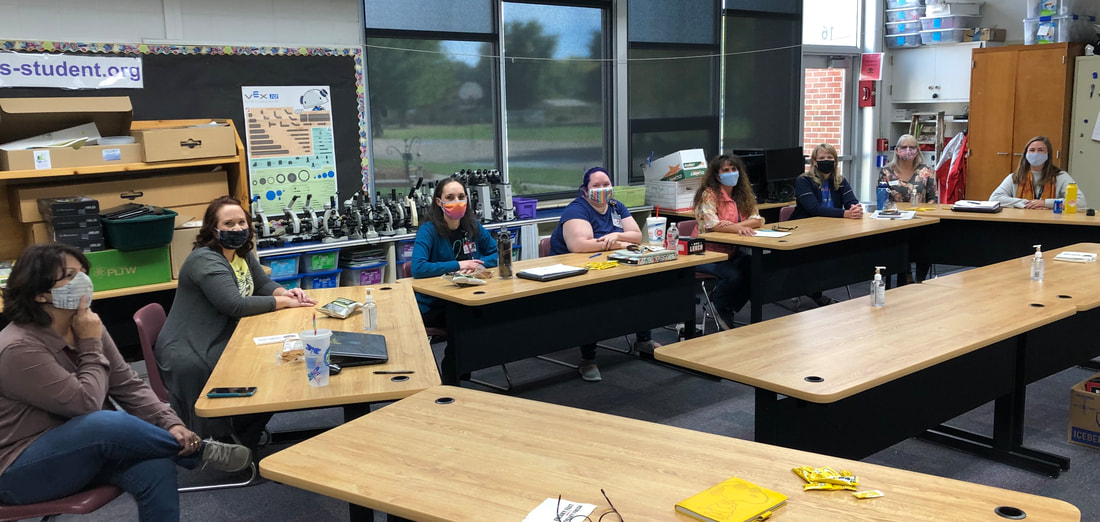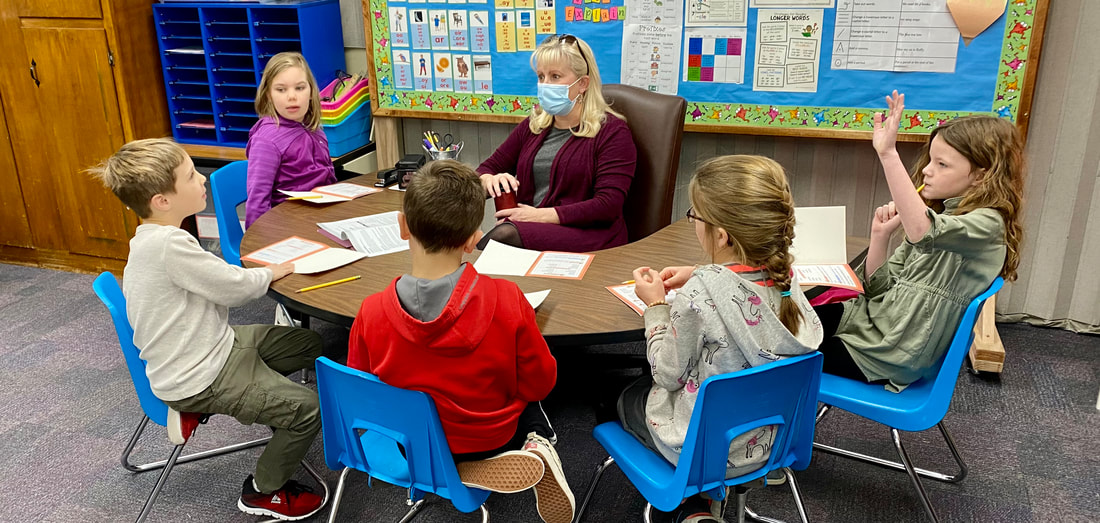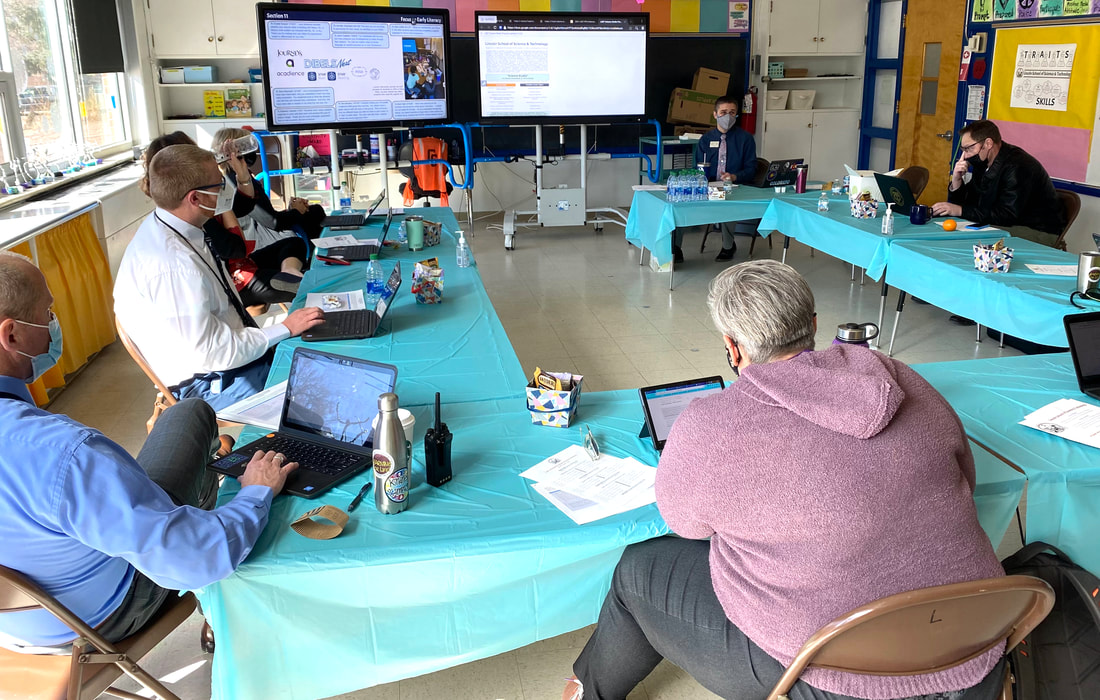LSST 2021 Instructional Program Review
What An Instructional Program Review Is
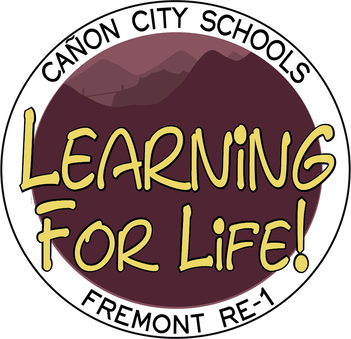
Purpose of this Process
The Cañon City School District believes by taking an in-depth look at each of its schools on an annual basis, through the lens of what it collectively strives to achieve as an educational system, it will identify opportunities for improvement and growth to assist schools in more effectively reaching their goals.
As we have created this vision for ourselves, we also believe we have the capacity within ourselves to conduct this process in a fair and equitable manner.
Plan for Implementation
Building site reviews take place each school year prior to Spring Break, with the goal of reporting results back to each staff and each school community by the end of each year.
In preparation for an annual review, each school leadership team prepares by creating a collective self-reflection of the agreed upon rubric. The Compass Committee, comprised of students, staff, parents, administrators, board members and key community leaders, appoints a review team to consist of the superintendent of schools, the assistant superintendent of schools, a selection of appropriate directors, at least one school principal (not assigned to the school being reviewed), a group of appropriate instructional coaches/coordinators, staff, and students. At least one board of education member will also participate in each site review process.
Site reviews are conducted over the course of a full school day and include opportunities for staff to present information and artifacts to the visiting team, as well as opportunities for the visiting team to observe live instruction.
Official results are formally reported to each staff and school community by the superintendent and assistant superintendent of schools after the Compass Committee approves them.
Each certified staff member will use their school’s final rating as a collective measure on their personal evaluation in lieu of their School Performance Rating if they so choose.
The 2020-21 Compass Committee consisted of the following members: George Welsh, Adam Hartman, Tim Renn, Bill Summers, Jesse Oliver, Marne Autobee, Kelly Albrecht, Jessi Hamilton, Karen Sartori, Brian Zamarripa, Scott Morton, Garrett Olguin, Jamie Eads, Ryan Brown, Mark Peacock, Larry Oddo, Ashley Smith, Brian Turner, Brad Rowland, Hope Kolman, Sean Williamson, Mary Kay Evans, Kelli Jones, and Beth Gaffney.
The Cañon City School District believes by taking an in-depth look at each of its schools on an annual basis, through the lens of what it collectively strives to achieve as an educational system, it will identify opportunities for improvement and growth to assist schools in more effectively reaching their goals.
As we have created this vision for ourselves, we also believe we have the capacity within ourselves to conduct this process in a fair and equitable manner.
Plan for Implementation
Building site reviews take place each school year prior to Spring Break, with the goal of reporting results back to each staff and each school community by the end of each year.
In preparation for an annual review, each school leadership team prepares by creating a collective self-reflection of the agreed upon rubric. The Compass Committee, comprised of students, staff, parents, administrators, board members and key community leaders, appoints a review team to consist of the superintendent of schools, the assistant superintendent of schools, a selection of appropriate directors, at least one school principal (not assigned to the school being reviewed), a group of appropriate instructional coaches/coordinators, staff, and students. At least one board of education member will also participate in each site review process.
Site reviews are conducted over the course of a full school day and include opportunities for staff to present information and artifacts to the visiting team, as well as opportunities for the visiting team to observe live instruction.
Official results are formally reported to each staff and school community by the superintendent and assistant superintendent of schools after the Compass Committee approves them.
Each certified staff member will use their school’s final rating as a collective measure on their personal evaluation in lieu of their School Performance Rating if they so choose.
The 2020-21 Compass Committee consisted of the following members: George Welsh, Adam Hartman, Tim Renn, Bill Summers, Jesse Oliver, Marne Autobee, Kelly Albrecht, Jessi Hamilton, Karen Sartori, Brian Zamarripa, Scott Morton, Garrett Olguin, Jamie Eads, Ryan Brown, Mark Peacock, Larry Oddo, Ashley Smith, Brian Turner, Brad Rowland, Hope Kolman, Sean Williamson, Mary Kay Evans, Kelli Jones, and Beth Gaffney.
Our Profile of a Graduate
Section I-Focus on Climate, Culture, Vision, and Purpose
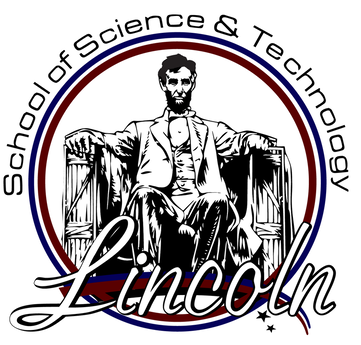
Staff Reflection
* Traits & Skills posters visible throughout the school
* School Vision & Mission Statements finalized mid-year 19/20
* Mission Statement read chorally with students during morning announcements
* Teacher-created posters to guide students during announcements each day
* School in its 20th year of Discovery Culture
* All-staff Discovery Training refresher in August
* Several teachers focus on Trait or Skill of the week
* I-Spy activity to identify Traits & Skills in her classroom
* Fifth-grade Traits & Skills geometric spheres hang from the classroom ceilings referred to during teachable moments
* Staff Handbook and Parent/Student Handbook
* Secretary's Lincoln Log and Principal's Weekly Update on a weekly basis
* Elementary counselor & staff promote tolerance through social skills groups and individual student support.
The prevalence of Traits & Skills-related conversation and focus has increased this year, but there is always room to improve how we incorporate the language into everything we do. The school is also utilizing the new full-time elementary counselor but will continue to refine how that position works within our school schedule to meet the needs of all students and continually build a more tolerant culture.
* Traits & Skills posters visible throughout the school
* School Vision & Mission Statements finalized mid-year 19/20
* Mission Statement read chorally with students during morning announcements
* Teacher-created posters to guide students during announcements each day
* School in its 20th year of Discovery Culture
* All-staff Discovery Training refresher in August
* Several teachers focus on Trait or Skill of the week
* I-Spy activity to identify Traits & Skills in her classroom
* Fifth-grade Traits & Skills geometric spheres hang from the classroom ceilings referred to during teachable moments
* Staff Handbook and Parent/Student Handbook
* Secretary's Lincoln Log and Principal's Weekly Update on a weekly basis
* Elementary counselor & staff promote tolerance through social skills groups and individual student support.
The prevalence of Traits & Skills-related conversation and focus has increased this year, but there is always room to improve how we incorporate the language into everything we do. The school is also utilizing the new full-time elementary counselor but will continue to refine how that position works within our school schedule to meet the needs of all students and continually build a more tolerant culture.
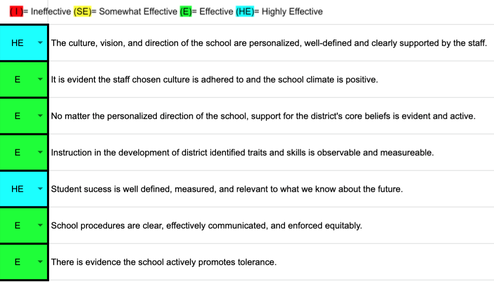
Reviewer Comments
- Evidence of Traits and Skill introduction for staff and students should equal an effective rating. Clear evidence of positive culture throughout the entire building. I liked the intentional use of inclusion of varying needs of skills.
- It is clear the skills and traits are incorporated throughout the school. They are part of team names. There is some measurement through your Lincoln Cards.
- LSST has gone through a thorough process of soliciting lots of "voices" in the creation of their mission and vision. Additionally, they've woven the 6 Ps and Discovery culture into the district-initiated focus on 14 Skills and Traits.
- LSST uses a Discovery Culture with the 6 P's and 5 A's. They started the year with a Discovery refresher for staff. Their vision and mission include the skills and traits and has been simplified for the students to recite during morning announcements.
- The climate in the building feels really great! It’s great that the mission/vision statement was changed to reflect Science and Technology. Hopefully, that will translate into more widespread usage of Science and Tech across the building and more meaningfully embedded into daily instruction.
- Lincoln has made a concerted effort to highlight traits and skills in a variety of ways. Strong growth in this work is indicated by student and parent surveys. The staff still needs to solidify its understanding and support of the district's core beliefs.
- Focus on Discovery culture, refresher training as a staff. A piece of better perceptions of the school culture. Trying to keep Discovery alive throughout the year. Works well with Traits and Skills. Recognizes they Have more work to do. Finding the commonalities between the Lincoln 6 P/Discovery expectations and Traits and Skills may help keep culture manageable.
- Staff is willing to do extras and move forward toward integrating STEM into each classroom day.
- Very positive and warm environment.
Compass Comment
Lincoln has developed a strong, renewed, collaboratively formed vision of itself and is in the early stages of that journey. The school exhibits outstanding procedures and practices for operation. We encourage staff to more clearly define their vision of student success, especially aligned to the future in light of its commitment to being a school of science and technology and the need to develop certain skills and traits in students.
Lincoln has developed a strong, renewed, collaboratively formed vision of itself and is in the early stages of that journey. The school exhibits outstanding procedures and practices for operation. We encourage staff to more clearly define their vision of student success, especially aligned to the future in light of its commitment to being a school of science and technology and the need to develop certain skills and traits in students.
Section II-Focus on Student Health and Social-Emotional Wellness
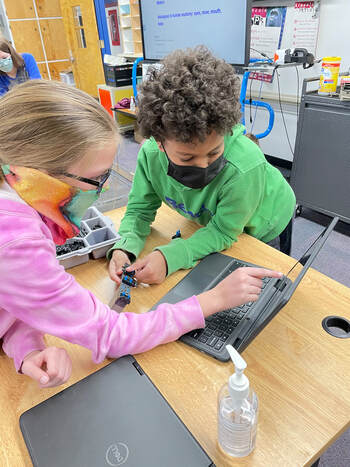
Staff Reflection
* RTI Team meets weekly to develop APAS plans based on academic and emotional/behavioral needs
* When necessary, a school counselor may be utilized in RTI to support students.
* Positive partnership with Gateway to Success to provide school-based counseling services to students
* BIMAS administration, led by a school counselor, twice per year
* BIMAS results evaluated and interpreted with District Behavioral Health Coordinator, Counselor, & Principal
* BIMAS results shared with BLT, and then each individual grade level
* Individual and Group Support for students in need by a counselor
* Mindfulness evidenced by principal walkthrough feedback to staff
* Mindfulness opportunities provided for staff via Jamie Murray & Gateway partnership
* Librarian provides focused books on feelings, problem-solving, and other emotional issues on her primary book carts
* Speech & SSN Team working with students to identify appropriate responses.
* Kindergarten practices mindfulness minutes after lunch to refocus for the afternoon
* Threat Assessments & Suicide Screeners completed by Principal, Counselor, and Case Manager
* Discovery Program promotes positive social skills
Safe-to-Tell continues to be available but is still not widely promoted. However, we foster a culture of transparency, where students feel safe communicating with staff, including the principal, about concerns. Concerns are addressed immediately and from a problem-solving approach.
* RTI Team meets weekly to develop APAS plans based on academic and emotional/behavioral needs
* When necessary, a school counselor may be utilized in RTI to support students.
* Positive partnership with Gateway to Success to provide school-based counseling services to students
* BIMAS administration, led by a school counselor, twice per year
* BIMAS results evaluated and interpreted with District Behavioral Health Coordinator, Counselor, & Principal
* BIMAS results shared with BLT, and then each individual grade level
* Individual and Group Support for students in need by a counselor
* Mindfulness evidenced by principal walkthrough feedback to staff
* Mindfulness opportunities provided for staff via Jamie Murray & Gateway partnership
* Librarian provides focused books on feelings, problem-solving, and other emotional issues on her primary book carts
* Speech & SSN Team working with students to identify appropriate responses.
* Kindergarten practices mindfulness minutes after lunch to refocus for the afternoon
* Threat Assessments & Suicide Screeners completed by Principal, Counselor, and Case Manager
* Discovery Program promotes positive social skills
Safe-to-Tell continues to be available but is still not widely promoted. However, we foster a culture of transparency, where students feel safe communicating with staff, including the principal, about concerns. Concerns are addressed immediately and from a problem-solving approach.
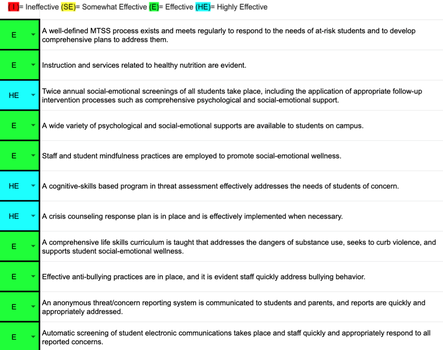
Reviewer Comments
- Clear evidence of effective response to Safe to Tell reports should equal an effective rating.
- I love what Abe does to get kids thinking about new food and veggies. The staff's willingness to step up and help provide for the clothes closet is awesome. Teachers obviously care about their students and are willing to go above and beyond for students. Kirsten has really stepped up the small groups.
- Two consecutive building reviews have highlighted a need for us to look at ST2 and how it's being used at the elementary level. Also really happy to see how LSST is using their school counselor.
- Kristen Trainer is able to meet students based on needs discovered through the BIMAS testing. She is full-time now at LSST which has allowed her to really create relationships with the students and know their needs deeply. LSST provides a backpack program and clothes closet to provide items for families in need. The librarian has used resources to provide books about more culturally diverse topics and promote tolerance. Pockets of mindfulness activities are taking place in the school. Garrett holds safety as the highest priority and has made several changes to parking, dismissal, and building procedures to create the safest environment possible. Abe England and the nutritional staff work together to teach students about new foods on their trays. LSST partners with Gateway to provide counseling services for students two days a week.
- The use of discovery, a full-time counselor, classroom circle-ups, and direct SEL instruction is all effective in meeting this goal.
- The school effectively responds to Safe2Tell and Gaggle reports in a timely fashion. There is great evidence of how the school's SEL program is peeling back layers of the onion when it comes to understanding students in need.
- Great to have the personal connection of a school counselor. A better avenue for younger kids to address social/emotional needs.
- The Backpack program is a great avenue for social/emotional support. Team effort to meet basic needs for kiddos.
- Multi-cultural and healthy habits books are offered and highlighted.
- Staff is intentional about checking in and building relationships with kids.
Compass Comment
Lincoln exhibits outstanding crisis response, faithfully participates in the district social-emotional screening process, and reacts appropriately. Evident practices focusing on the social-emotional wellness of ALL students displayed through the whole staff. We love how staff is encouraging students to try new and interesting foods through personal artistry. How can this effort toward nutrition be expanded to making generally good choices?
Lincoln exhibits outstanding crisis response, faithfully participates in the district social-emotional screening process, and reacts appropriately. Evident practices focusing on the social-emotional wellness of ALL students displayed through the whole staff. We love how staff is encouraging students to try new and interesting foods through personal artistry. How can this effort toward nutrition be expanded to making generally good choices?
Section III-Focus on Innovative Instruction
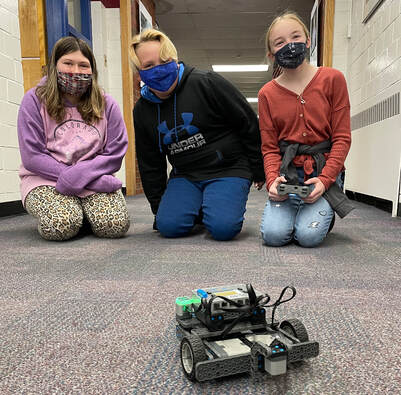
Staff Reflection
* Several staff working on advanced degrees with support of principal
* Paraprofessionals encouraged to take part in LETRS training
* Ms. Brown offered the Original Works art fundraiser project this year
* Mrs. Miller offers alternative activities for students who aren't wearing masks while singing
* Mr. Walter teaches Project Lead the Way robotics lessons
* Virtual Reality goggles being introduced to teachers this year
* Mrs. Trainor provides enrichment in her social skills groups
* Mrs. Rall introduced the Strider bike unit to her primary students this year
* Transition from Promethean to Clevertouch
* Document Cameras used where appropriate; more on back-order
* Same-day walkthrough feedback shared with staff that is focused on 3 Pillars, Core, and school culture
* Professional Growth Plan support sessions to develop effective goals
* All students afforded technology-oriented lessons each day
* Principal follows all Master Agreement requirements for evaluation of Probationary & Non-Probationary Staff
* Improved formative assessment practices embedded throughout the days.
* Virtual Reality Goggles
* Walkthrough feedback is provided same-day and is focused on the Three Pillars, Core Beliefs, and Discovery Culture
* PTO is included in the discussion about the development of Vision and Mission, as well as the UIP
We have made great progress to set ourselves apart with our STEM approach and Project Lead the Way curriculum. However, there is still much work to do in the area of blended learning. Soon, we will begin to incorporate the SAMR approach with our Chromebook use.
* Several staff working on advanced degrees with support of principal
* Paraprofessionals encouraged to take part in LETRS training
* Ms. Brown offered the Original Works art fundraiser project this year
* Mrs. Miller offers alternative activities for students who aren't wearing masks while singing
* Mr. Walter teaches Project Lead the Way robotics lessons
* Virtual Reality goggles being introduced to teachers this year
* Mrs. Trainor provides enrichment in her social skills groups
* Mrs. Rall introduced the Strider bike unit to her primary students this year
* Transition from Promethean to Clevertouch
* Document Cameras used where appropriate; more on back-order
* Same-day walkthrough feedback shared with staff that is focused on 3 Pillars, Core, and school culture
* Professional Growth Plan support sessions to develop effective goals
* All students afforded technology-oriented lessons each day
* Principal follows all Master Agreement requirements for evaluation of Probationary & Non-Probationary Staff
* Improved formative assessment practices embedded throughout the days.
* Virtual Reality Goggles
* Walkthrough feedback is provided same-day and is focused on the Three Pillars, Core Beliefs, and Discovery Culture
* PTO is included in the discussion about the development of Vision and Mission, as well as the UIP
We have made great progress to set ourselves apart with our STEM approach and Project Lead the Way curriculum. However, there is still much work to do in the area of blended learning. Soon, we will begin to incorporate the SAMR approach with our Chromebook use.
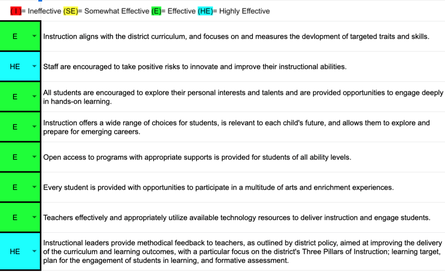
Reviewer Comments
- I feel the building is doing everything possible to support student opportunities, especially with COVID restrictions in place.
- This staff is willing to continue to pilot new programs. The work in STEM is awesome, and the continued commitment through the issues has been commendable.
- LSST has opted to pilot a science curriculum for the district. This is no small task for the teachers and should be applauded as this is the second year of a new program they are piloting. Teachers use virtual reality goggles to enhance instruction. They also use robotics as a way to engage students in innovative instruction. Their technologist focuses on STEM activities.
- Innovative instruction may be happening however, we did not get to see it today—still very traditional. In a school of Science, for example, there were blackline masters of cute butterflies to show change over time but could they have been more scientifically accurate, and/or did they actually examine caterpillars turning into butterflies?
- People want to do training. Many are doing LTRS training, virtual reality goggles. Continued work on how to measure traits and skills, perhaps self-assessments. Innovation with virtual goggles, experiencing tech glitches during beginning implementation. Kids are programming robots now. Vision and Mission are evident throughout the building culture and lessons. Everyone in the building is considered an educator and works toward enhancing the STEM curriculum. Use the g/t dept. to infuse rigor into the new science curriculum.
- The instruction is strong and very traditional. I'd like to see more innovative instruction(understandably difficult to do with scripted curriculum), with more depth and complexity. More questioning by teachers and students able to explain the why's and how's.
Compass Comment
The Lincoln staff is constantly encouraged to take positive risks, and we see them doing so. Leadership provides methodical feedback to instructional staff, and this is leading toward instructional improvement, especially for novice teachers. The Lincoln staff feels art experiences need to expand for students. They have a plan, have presented it to the administration, and this expansion has been approved. We look forward to its effective implementation.
The Lincoln staff is constantly encouraged to take positive risks, and we see them doing so. Leadership provides methodical feedback to instructional staff, and this is leading toward instructional improvement, especially for novice teachers. The Lincoln staff feels art experiences need to expand for students. They have a plan, have presented it to the administration, and this expansion has been approved. We look forward to its effective implementation.
Section IV-Focus on Equity of Opportunity
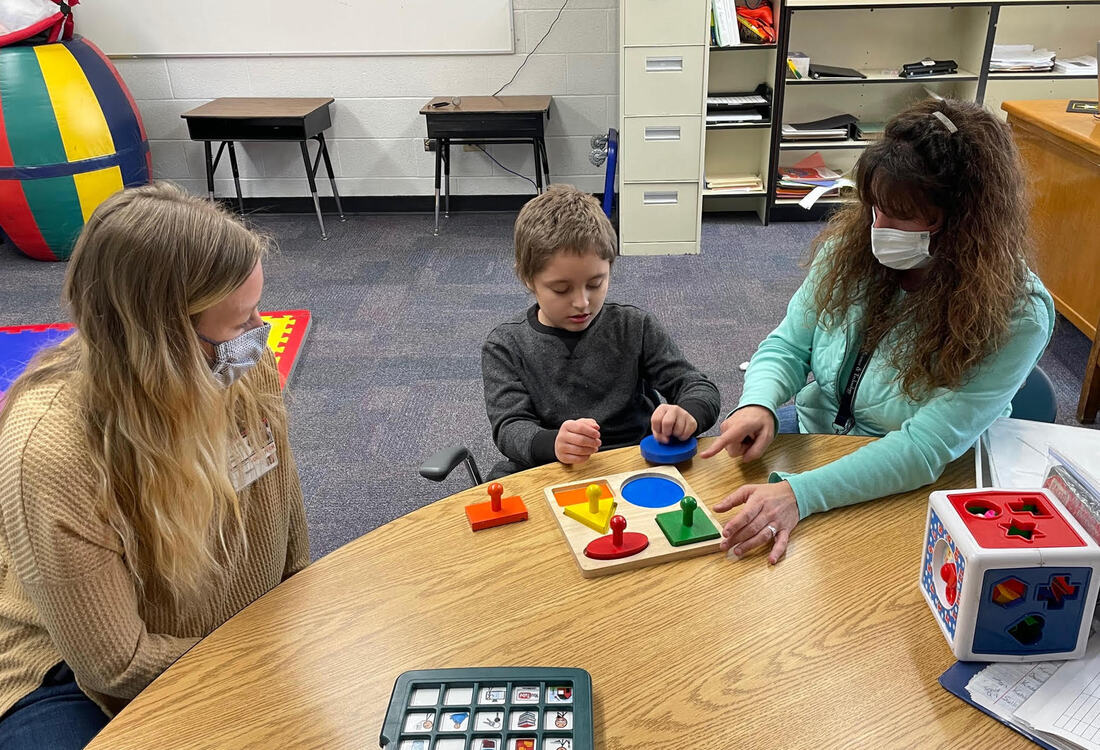
Staff Reflection
* Mild, moderate, and severe needs Special Education students included in general education as much as is appropriate
* Reading groups based on skills level, not the "program" (SSN, SpEd, Title) the student is in
* Collaborating with CDE to become a Model SSN Program
* Collaborated w/ CDE consultant to develop an Action Plan
* Gifted Identification based on collaboration with GATE Specialist
* GATE processes and deadline (per district expectation) shared out by specialist and Weekly Update
* Staff participated in Mark Hess GATE PD
We continue to strive for more differentiation opportunities for our highest level of learners in mainstream lesson planning.
* Mild, moderate, and severe needs Special Education students included in general education as much as is appropriate
* Reading groups based on skills level, not the "program" (SSN, SpEd, Title) the student is in
* Collaborating with CDE to become a Model SSN Program
* Collaborated w/ CDE consultant to develop an Action Plan
* Gifted Identification based on collaboration with GATE Specialist
* GATE processes and deadline (per district expectation) shared out by specialist and Weekly Update
* Staff participated in Mark Hess GATE PD
We continue to strive for more differentiation opportunities for our highest level of learners in mainstream lesson planning.
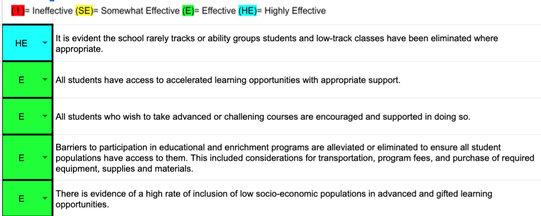
Reviewer Comments
- Very solid instructional opportunities and routines in place to support individual learners. I really like the robotics work and I encourage the school to lean on that opportunity and expand it to support relevant instructional opportunities for as many students as possible. I love the complex process analysis that is taking place in that unit. Very exciting work!
- How much of your gifted population is part of GT? The work at the other end of the spectrum is fantastic. It is such huge growth, and I'm so excited to see it continue.
- I'm especially impressed by how LSST is sensitive to LRE during a time that they're attempting to be more and more collaborative.
- LSST has focused on including students from the SSN program as much as possible. They have reached out to CDE and visited Fremont Elementary school to learn how to make their SSN program an exemplar program. Their SSN teacher has provided PD for her staff and is sending home videos to train parents on different topics to meet the needs of her students.
- Wonderful focus on inclusion of special education populations in the regular classroom setting.
- Lincoln has already done a great job of inclusion of SSN kids, even better this year with students flooding more into the regular classroom. A lot of work has gone into being a model SSN site, through training of paras and parent education/communication. Love the opportunity the science lab affords, the design process encourages students to think creatively and critically, try and fail and try again, as real-world scientists do.
- Great job for Kinder to teach their students how to navigate virtual learning. Way to be prepared and offer opportunities for the little ones.
Compass Comment
The Lincoln staff has strong instructional practices in place to support individual learners. The Compass team was blown away by the positive transformation of the center-based program and the general Inclusiveness of it. It is well on its way to becoming a state model.
The Lincoln staff has strong instructional practices in place to support individual learners. The Compass team was blown away by the positive transformation of the center-based program and the general Inclusiveness of it. It is well on its way to becoming a state model.
Section V-Focus on Opportunities for Learning Experiences
Staff Reflection
* Where possible, students are encouraged to participate in extensions of learning
* 5th Grade Band instructor has gone above and beyond to provide the experience for students
* Teachers available for individual support of students before/after school
* STEM curriculum - PLTW
* Adaptive Life Skills opportunities for SSN students, along with Life Skills w/ their peers
* Individual and class goals on desks in some classrooms are academic, social, and future-focused
We continue to hone our instruction on our district Traits & Skills, although there is an improvement compared to last year. We still desire to implement a Peer Mentoring program between intermediate and primary students, when Covid restrictions ease up and it would be allowed.
* Where possible, students are encouraged to participate in extensions of learning
* 5th Grade Band instructor has gone above and beyond to provide the experience for students
* Teachers available for individual support of students before/after school
* STEM curriculum - PLTW
* Adaptive Life Skills opportunities for SSN students, along with Life Skills w/ their peers
* Individual and class goals on desks in some classrooms are academic, social, and future-focused
We continue to hone our instruction on our district Traits & Skills, although there is an improvement compared to last year. We still desire to implement a Peer Mentoring program between intermediate and primary students, when Covid restrictions ease up and it would be allowed.
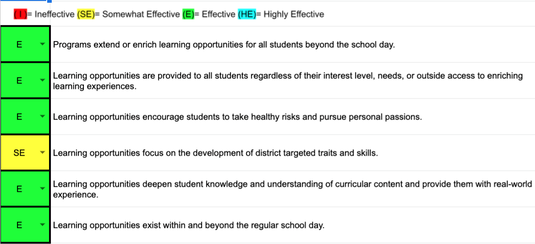
Reviewer Comments
- There is clear evidence of high-quality inclusion practices in all areas.
- Learning targets are met through learning especially in STEM. I think your teachers are embedding them more than meets the eye.
- The school is clearly making strides to provide more enriched learning experiences, including PLTW.
- Project Lead the Way curriculum is used to teach robotics and computer science to all students. This is always connected to a problem for the students to solve which is a real-life problem.
- Like seeing the connection to the real world in Dwayne’s class as per video.
- LSST is better at supporting learning opportunities related to traits and skills than it thinks.
- Good use of SSN facilities, and a great job working to a more comprehensive inclusion model. The sensory room is awesome!
- Title 1 services were solid, time to build relationships as well as focused whole-child instruction.
- SSN nice use of organization board with students.
Compass Comment
Lincoln is clearly encouraging students to take positive academic risks and offering more enriching learning experiences to all students. Though good work was done to personally brand its focus on district-identified Traits and Skills in the 2019-20 school year, these do not seem to fall within instructional learning targets, and the instructional focus on district-identified Traits and Skills was not readily evident during our visit.
Lincoln is clearly encouraging students to take positive academic risks and offering more enriching learning experiences to all students. Though good work was done to personally brand its focus on district-identified Traits and Skills in the 2019-20 school year, these do not seem to fall within instructional learning targets, and the instructional focus on district-identified Traits and Skills was not readily evident during our visit.
Section VI-Focus on Effective Assessment Procedures
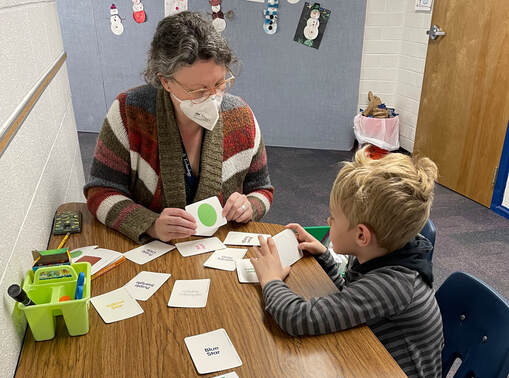
Staff Reflection
* Common Writing Assessments completed and rubrics are utilized
* Small group students in primary grades self-edit work per literacy curricular rubrics
* LB scores analyzed periodically to ensure appropriate group placement
* 2nd Grade student groups identify, review, and update goals for improving their ORF
* 2nd Grade Math - complete online practice buddy as formative assessment. If correct, move on. Incorrect, teacher table practice
* Fifth graders worked cooperatively to create models of the four spheres (atmosphere, geosphere, biosphere, and hydrosphere). Then, create a presentation of the models and explain how the different spheres interact with each other. Critique each other's dioramas
* 2nd Grade share drafts with others, suggestion, and feedback on improving writing
* Ms. Brown uses peer critique for art projects
* 5th-grade math - critique each other's examples against standards, explain why and make suggestions for improving scores
* Use of PDSA model to intentionally plan for small group reading instruction
* Same grade level teachers have common planning times for collaboration
* Benchmark Testing with Acadience & STAR completed on time
* Teacher collaboration time is provided on Early Release Fridays
There is always room for improvement with formative assessment. We continually work toward moving from formatively assessing students toward consistently making changes in instruction based on the results. There is still much work to do in measuring the development of traits and skills. The staff is open to guidance from the district on how this should be done.
* Common Writing Assessments completed and rubrics are utilized
* Small group students in primary grades self-edit work per literacy curricular rubrics
* LB scores analyzed periodically to ensure appropriate group placement
* 2nd Grade student groups identify, review, and update goals for improving their ORF
* 2nd Grade Math - complete online practice buddy as formative assessment. If correct, move on. Incorrect, teacher table practice
* Fifth graders worked cooperatively to create models of the four spheres (atmosphere, geosphere, biosphere, and hydrosphere). Then, create a presentation of the models and explain how the different spheres interact with each other. Critique each other's dioramas
* 2nd Grade share drafts with others, suggestion, and feedback on improving writing
* Ms. Brown uses peer critique for art projects
* 5th-grade math - critique each other's examples against standards, explain why and make suggestions for improving scores
* Use of PDSA model to intentionally plan for small group reading instruction
* Same grade level teachers have common planning times for collaboration
* Benchmark Testing with Acadience & STAR completed on time
* Teacher collaboration time is provided on Early Release Fridays
There is always room for improvement with formative assessment. We continually work toward moving from formatively assessing students toward consistently making changes in instruction based on the results. There is still much work to do in measuring the development of traits and skills. The staff is open to guidance from the district on how this should be done.
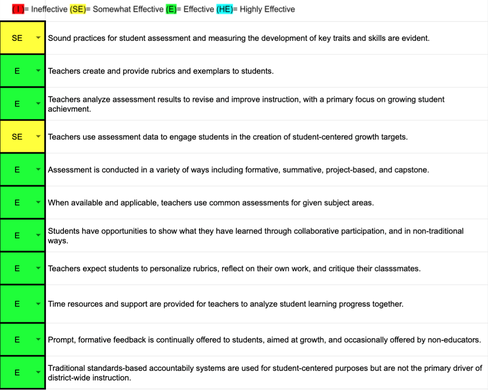
Reviewer Comments
- Creative use of formative assessments to help drive instructional decisions.
- With the exception of Dwayne's class, I didn't see a lot of evidence of project-based learning or nontraditional learning. I didn't see examples of rubrics or exemplars (doesn't mean it isn't there). I did see a chance for students to critique other students.
- It appears that LSST still needs and desires more work with assessment structures. The school should be commended for the fact that some staff members have utilized PDSA despite the fact that it wasn't required.
- Many teachers are still using the PDSAs as a form of formative assessment. Teachers are also using many other forms of assessment like checks for understanding and curriculum assessments. One teacher used a rubric with students so they could self-assess their progress on a specific skill.
- Special kudos for continuing the use of PDSAa throughout. Very good examples of other means of formative assessment.
- Great idea to have peer critiques. Kids setting personal goals is next.
- Teacher mentors for new teachers are key to effective practices.
Compass Comment
At Lincoln, assessment is conducted in a variety of ways, but this still needs to improve, especially in the form of offering more project-based and open-ended ways for students to show what they have learned, and use of teacher and student-created rubrics and exemplars. We see very little engagement of students in creating student-centered learning targets and goals, and not much evidence of how the school is measuring student development of traits and skills.
At Lincoln, assessment is conducted in a variety of ways, but this still needs to improve, especially in the form of offering more project-based and open-ended ways for students to show what they have learned, and use of teacher and student-created rubrics and exemplars. We see very little engagement of students in creating student-centered learning targets and goals, and not much evidence of how the school is measuring student development of traits and skills.
Section VII-Focus on Improvement of Instruction and Learning
Staff Reflection
* Common Writing Assessments completed and rubrics are utilized
* Small group students in primary grades self-edit work per literacy curricular rubrics
* LB scores analyzed periodically to ensure appropriate group placement
* 2nd Grade student groups identify, review, and update goals for improving their ORF
* 2nd Grade Math - complete online practice buddy as formative assessment. If correct, move on. Incorrect, teacher table practice
* Fifth graders worked cooperatively to create models of the four spheres (atmosphere, geosphere, biosphere, and hydrosphere). Then, create a presentation of the models and explain how the different spheres interact with each other. Critique each other's dioramas
* 2nd Grade share drafts with others, suggestion, and feedback on improving writing
* Ms. Brown uses peer critique for art projects
* 5th-grade math - critique each other's examples against standards, explain why and make suggestions for improving scores
* Use of PDSA model to intentionally plan for small group reading instruction
* Same grade level teachers have common planning times for collaboration
* Benchmark Testing with Acadience & STAR completed on time
* Teacher collaboration time is provided on Early Release Fridays
* New teachers and their mentors (both building and district-level) meet regularly
* All building-wide decisions are decided on in a widely representative Building Leadership Team
* Beginning-of-year PD focused on autism and supporting autistic children and their peers
* Beginning-of-year PD led by Special Education Teachers & Speech-Language Pathologist on inclusion; library followed up with support and targeted book selections
* Some staff took advantage of Love and Logic provided by the district
* Staff encouraged to, and voluntarily, seek guidance from CCSD ELA and LB Coordinators
* Voluntary staff participation to make Lincoln an SSN Program Model Site
* In the process of planning PD to incorporate Virtual Reality Goggles into classroom instruction
* Educational Technologist regularly collaborates with District Instructional Technology Coordinator
* All certified staff, and most classified staff, actively participating in LETRS Training
* Principal offers feedback almost "in the moment" when doing Walkthrough Observations
* All evaluation deadlines and requirements, per the Master Agreement, are followed
The school is moving toward becoming an SSN Model site, but is only at the beginning stages of the process, moving slowly due to Covid restrictions. Our goal is to set ourselves apart in this area to become known as the most inclusive school in the district.
* Common Writing Assessments completed and rubrics are utilized
* Small group students in primary grades self-edit work per literacy curricular rubrics
* LB scores analyzed periodically to ensure appropriate group placement
* 2nd Grade student groups identify, review, and update goals for improving their ORF
* 2nd Grade Math - complete online practice buddy as formative assessment. If correct, move on. Incorrect, teacher table practice
* Fifth graders worked cooperatively to create models of the four spheres (atmosphere, geosphere, biosphere, and hydrosphere). Then, create a presentation of the models and explain how the different spheres interact with each other. Critique each other's dioramas
* 2nd Grade share drafts with others, suggestion, and feedback on improving writing
* Ms. Brown uses peer critique for art projects
* 5th-grade math - critique each other's examples against standards, explain why and make suggestions for improving scores
* Use of PDSA model to intentionally plan for small group reading instruction
* Same grade level teachers have common planning times for collaboration
* Benchmark Testing with Acadience & STAR completed on time
* Teacher collaboration time is provided on Early Release Fridays
* New teachers and their mentors (both building and district-level) meet regularly
* All building-wide decisions are decided on in a widely representative Building Leadership Team
* Beginning-of-year PD focused on autism and supporting autistic children and their peers
* Beginning-of-year PD led by Special Education Teachers & Speech-Language Pathologist on inclusion; library followed up with support and targeted book selections
* Some staff took advantage of Love and Logic provided by the district
* Staff encouraged to, and voluntarily, seek guidance from CCSD ELA and LB Coordinators
* Voluntary staff participation to make Lincoln an SSN Program Model Site
* In the process of planning PD to incorporate Virtual Reality Goggles into classroom instruction
* Educational Technologist regularly collaborates with District Instructional Technology Coordinator
* All certified staff, and most classified staff, actively participating in LETRS Training
* Principal offers feedback almost "in the moment" when doing Walkthrough Observations
* All evaluation deadlines and requirements, per the Master Agreement, are followed
The school is moving toward becoming an SSN Model site, but is only at the beginning stages of the process, moving slowly due to Covid restrictions. Our goal is to set ourselves apart in this area to become known as the most inclusive school in the district.
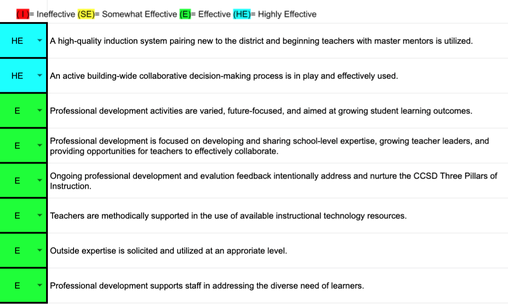
Reviewer Comments
- Great examples of the building using a variety of strategies to support learning for all students.
- We observed examples of great PD being led by Garrett, are teachers helping to lead PD? What experts (from outside the district/school) are being brought in to help facilitate PD.
- LSST still conducts PLCs for teachers to collaborate and look at data to inform instruction. Also, Garrett provided PD based on needs identified the year prior for the Discovery Culture, inclusion, and use of technology.
- We appreciate that LSST has a more representative leadership team now. We appreciate how the school has trained all staff in how to effectively include SSN students in the regular classroom. Lincoln is working in consort with the CDE to support the development of the SSN program in a more inclusive manner.
- Staff are using the classroom display boards effectively to enhance instruction. Consistent planning and use of district curriculum. Quizlet is a great engagement tool.
Compass Comment
Lincoln makes great use of the district induction and mentoring processes. They have also sustained great collaborative decision-making practices across their past two leaders. We encourage the staff to begin to focus on providing professional development that helps teachers to support parents to help their children with their learning.
Lincoln makes great use of the district induction and mentoring processes. They have also sustained great collaborative decision-making practices across their past two leaders. We encourage the staff to begin to focus on providing professional development that helps teachers to support parents to help their children with their learning.
Section VIII-Focus on Support for Positive Student Behavior
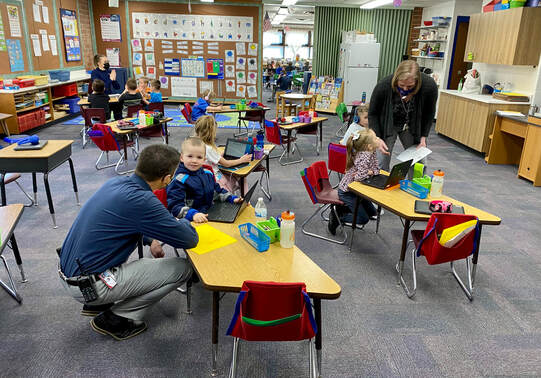
Staff Reflection
* Progressive Discipline Matrix aimed at restorative disciplinary processes
* Behavior charts and Behavior Intervention Plans within IEPs are based on positive reinforcement and working toward a goal rather than not earning and losing out on preferred activity or item
* Virtual Trimester Awards Assemblies recorded and shared with all cohorts and families via YouTube
* Kindergarten-focused mindfulness practices (breathing, water breaks, calm down corner, close eyes and picture positive choices, mindfulness GoNoodle activities)
* District Policy for behavior expectations is followed
* Parent/Student handbook shared with families
* Teachers use multiple communication tools to maintain positive relationships with parents
* Discovery Culture includes Conflict Resolution guidance that includes I-Messages
* Staff enter Teacher Documentations to track student behavior and parent communication
* Behavior Referrals & Resolution addressed by the principal
* Behavior concerns and resolutions always addressed and communicated to parents same-day
* Behavioral support system in place with Principal, Counselor, and Case Manager supporting
While we are providing more opportunities for students to practice mindfulness activities, we continue to work on strategies to support students' ability to cope with stressful situations. Our school counselor has been outstanding as a support for this and we will continue to get better and better!
* Progressive Discipline Matrix aimed at restorative disciplinary processes
* Behavior charts and Behavior Intervention Plans within IEPs are based on positive reinforcement and working toward a goal rather than not earning and losing out on preferred activity or item
* Virtual Trimester Awards Assemblies recorded and shared with all cohorts and families via YouTube
* Kindergarten-focused mindfulness practices (breathing, water breaks, calm down corner, close eyes and picture positive choices, mindfulness GoNoodle activities)
* District Policy for behavior expectations is followed
* Parent/Student handbook shared with families
* Teachers use multiple communication tools to maintain positive relationships with parents
* Discovery Culture includes Conflict Resolution guidance that includes I-Messages
* Staff enter Teacher Documentations to track student behavior and parent communication
* Behavior Referrals & Resolution addressed by the principal
* Behavior concerns and resolutions always addressed and communicated to parents same-day
* Behavioral support system in place with Principal, Counselor, and Case Manager supporting
While we are providing more opportunities for students to practice mindfulness activities, we continue to work on strategies to support students' ability to cope with stressful situations. Our school counselor has been outstanding as a support for this and we will continue to get better and better!
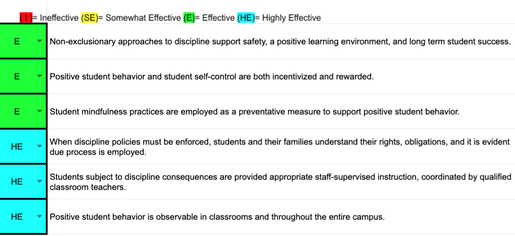
Reviewer Comments
- Creative support of students that go above and beyond the standard use of DISCO.
- YouTube channel is a great way to reach parents. I love that you are doing awards assemblies through youtube. I hope that continues. Restorative justice is obviously working and I appreciate the willingness to continue to grow in this. Students were very receptive and kind. The whole building feels positive and welcoming.
- LSST has created tickets for students who demonstrate the skills and traits. They then can use those tickets to pick a prize. Mr. England has created a YouTube video for the awards so parents can watch their child receive an award. Garrett has implemented restorative practices for students which have focused more on the positive rather than a punishment.
- Glad to see the use of restorative practices. The kids in this building are well behaved and respectful but RP will allow them to shift ownership of student behavior from adults to the kids.
- We very much appreciate the use of restorative discipline practices. This is ensuring children are learning from their transgressions.
- Good job on the virtual awards assembly! And delegating some safety processes and procedures to staff. Karen offers free yoga for staff after school, an example of positive self-care. Great use of tech, cameras, YouTube announcements, awards.
Compass Comment
Surveys indicate Lincoln staff and administration effectively communicate with parents, including procedural and behavioral expectations. This was much needed and appreciated in this unique year. Discipline policies are fairly applied to all students, and parents and students alike seem to understand why they are being applied. We also very much appreciate the non-exclusionary approach Lincoln takes to student discipline. This is a model for the rest of the district.
Surveys indicate Lincoln staff and administration effectively communicate with parents, including procedural and behavioral expectations. This was much needed and appreciated in this unique year. Discipline policies are fairly applied to all students, and parents and students alike seem to understand why they are being applied. We also very much appreciate the non-exclusionary approach Lincoln takes to student discipline. This is a model for the rest of the district.
Section IX-Focus on Resource Acquisition and Maintenance of a Safe Learning Environment
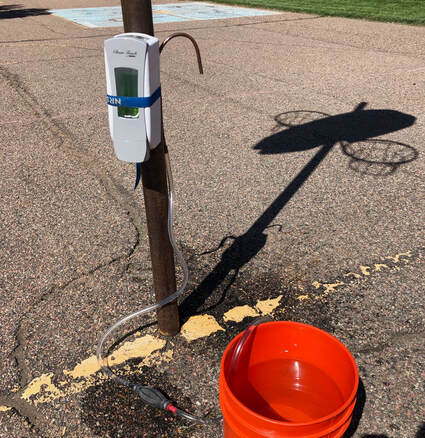
Staff Reflection
* New Parking Lot added 23 parking spaces to alleviate congestion
* Front parking spaces redesigned to eliminate double-parking concerns
* Continued closure of west parking lot to parent vehicle traffic
* Unstable large tree west of building removed very soon after reporting to Jeff Peterson
* Mid-Year carpet cleaning due to eating in classrooms during Covid restrictions
* BLT and BSERT established common playground expectations
* One adult assigned per cohort for lunch and recess supervision
* Expanded outside supervision for breakfast carts and student cohort lines.
* LED sign shows parents appropriate use of parking areas
* Reminders to students on virtual morning announcements re: appropriate playground use
* Purchase of additional Project Lead the Way VEX kits above and beyond what was originally provided by the district
* Purchase of document cameras for staff (currently on backorder)
* New Parking Lot added 23 parking spaces to alleviate congestion
* Front parking spaces redesigned to eliminate double-parking concerns
* Continued closure of west parking lot to parent vehicle traffic
* Unstable large tree west of building removed very soon after reporting to Jeff Peterson
* Mid-Year carpet cleaning due to eating in classrooms during Covid restrictions
* BLT and BSERT established common playground expectations
* One adult assigned per cohort for lunch and recess supervision
* Expanded outside supervision for breakfast carts and student cohort lines.
* LED sign shows parents appropriate use of parking areas
* Reminders to students on virtual morning announcements re: appropriate playground use
* Purchase of additional Project Lead the Way VEX kits above and beyond what was originally provided by the district
* Purchase of document cameras for staff (currently on backorder)
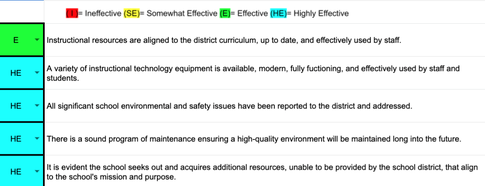
Reviewer Comments
- Nice use of resource acquisition and maintenance.
- Really nice work with PLTW, the new playground, the new parking lot, and advocacy for the new Art/STEM program.
- LSST has advocated for a new class utilizing a full-time art teacher to offer a new class opportunity. The classrooms are the cleanest, most organized I have seen in the district. Garrett places a high priority on safety and shows this with the use of cameras, parking, and expectations of the students and staff. The school schedule to start the year with the COVID restrictions was well thought out and very well implemented.
- The building looks great inside and out!
- The Safe Routes to School project, as well as additional district support with paving and parking areas have pretty much transformed the Lincoln neighborhood.
- All processes and procedures lend to a safe learning environment. Abe and Trish are invaluable resources for Lincoln in this area.
Compass Comment
The Lincoln staff, through constant advocacy, has literally transformed its neighborhood and grounds in the form of added safe routes to school sidewalks and roads, additional parking spaces to unclog daily pick-up and drop off routines, the addition of a cool school marquee to broadcast messages to the neighborhood, and a community accessible playground, even for physically challenged children. In addition to this, the staff makes use of what they have and local ingenuity to do things like creating outdoor hand washing stations to tighten daily transition routines, and to maintain district-purchased technology.
The Lincoln staff, through constant advocacy, has literally transformed its neighborhood and grounds in the form of added safe routes to school sidewalks and roads, additional parking spaces to unclog daily pick-up and drop off routines, the addition of a cool school marquee to broadcast messages to the neighborhood, and a community accessible playground, even for physically challenged children. In addition to this, the staff makes use of what they have and local ingenuity to do things like creating outdoor hand washing stations to tighten daily transition routines, and to maintain district-purchased technology.
Section XI - Focus on Early Literacy
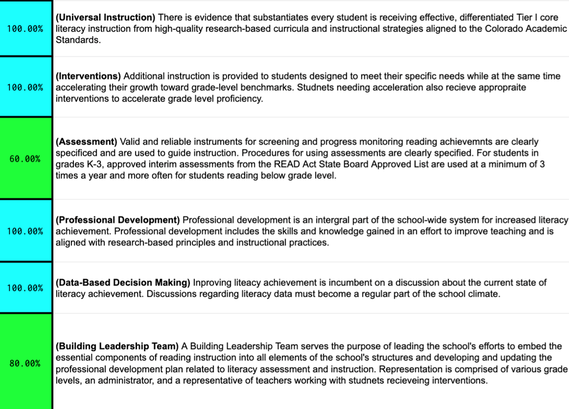
Staff Reflection
All of Lincoln's homeroom teachers plan for a minimum of 90 minutes of literacy instruction each day. There are 30 minutes dedicated to whole group instruction, with 60 minutes for small group reading rotations. Staff utilize the district-provided resource, Journeys, as the primary curriculum. Intentional planning for reading small groups is expected and often takes on the form of a PDSA document. We have not provided the level of intervention support that we did last year. Lincoln utilized a cross-grade-level model to start a daily Intervention Block during the 19/20 school year. Covid restrictions prevented that from happening during the current year, which consequently decreased the number of Tier II and III supports. It is time for us to calibrate for the administration of assessments. Title, SpEd, and Classroom teachers collaborate regularly, but more effort can be made to provide dedicated work time during early release Fridays.
All of Lincoln's homeroom teachers plan for a minimum of 90 minutes of literacy instruction each day. There are 30 minutes dedicated to whole group instruction, with 60 minutes for small group reading rotations. Staff utilize the district-provided resource, Journeys, as the primary curriculum. Intentional planning for reading small groups is expected and often takes on the form of a PDSA document. We have not provided the level of intervention support that we did last year. Lincoln utilized a cross-grade-level model to start a daily Intervention Block during the 19/20 school year. Covid restrictions prevented that from happening during the current year, which consequently decreased the number of Tier II and III supports. It is time for us to calibrate for the administration of assessments. Title, SpEd, and Classroom teachers collaborate regularly, but more effort can be made to provide dedicated work time during early release Fridays.
Final Rating and Next Step Recommendations
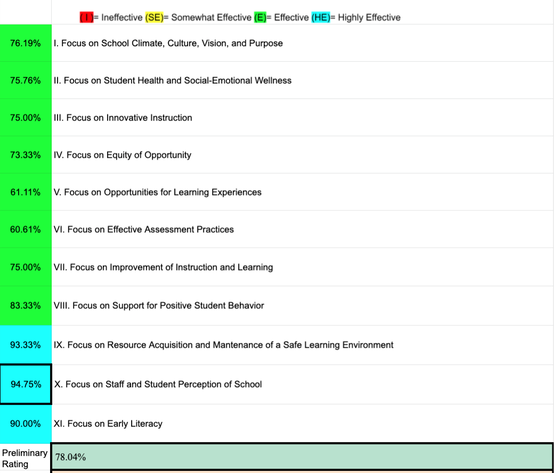
Lincoln School of Science and Technology’s final rating for 2021 is 78.04 %. This lands the school in the Effective category.
The Compass Committee recognizes the Lincoln School of Science and Technology’s effort to align its practices to the district’s vision, mission, core beliefs, and attainment of its graduate profile traits and skills.
This is only the second year Lincoln School of Science and Technology has been rated according to this rubric, and 2021 is an improvement over the prior-year rating.
As a result of this review, the Cañon City Schools Compass Committee suggests the following areas of focus to further improve student learning outcomes:
-Develop and implement a consistent approach to the planning phase of instruction, reflected in the use of PDSAs (Plan / Do / Study / Act) for all teachers.
-Solidify teacher adherence to our 3 Pillars of Instruction with a special emphasis on Pillar 3, formative assessment. Remind all staff it is not about the teaching, it is about student learning, and it can’t be about learning if what students learn is not measured.
-Implementation of unique and focused staff teams that address specific targets, such as: STEM development, Discovery Culture, and school-wide initiatives. These teams will work hand-in-hand with general teacher-leader development.
-In the 2021-22 school year the Lincoln School of Science and Technology will receive an additional $333 per student allocation, thanks to federal ESSER III funding. A preliminary proposal was submitted to the district in April 2021 to guide how these dollars will be invested to keep the doors to the school open, catch students up on learning opportunities lost as a result of the COVID pandemic, and drive innovative education opportunities forward in alignment with our district vision, mission, core beliefs, and adopted traits and skills. Please review the feedback the district has offered on your proposal and submit a revised plan for approval, then see to it that each initiative is successfully implemented for the benefit of improved student learning opportunities and outcomes.
The Compass Committee recognizes the Lincoln School of Science and Technology’s effort to align its practices to the district’s vision, mission, core beliefs, and attainment of its graduate profile traits and skills.
This is only the second year Lincoln School of Science and Technology has been rated according to this rubric, and 2021 is an improvement over the prior-year rating.
As a result of this review, the Cañon City Schools Compass Committee suggests the following areas of focus to further improve student learning outcomes:
-Develop and implement a consistent approach to the planning phase of instruction, reflected in the use of PDSAs (Plan / Do / Study / Act) for all teachers.
-Solidify teacher adherence to our 3 Pillars of Instruction with a special emphasis on Pillar 3, formative assessment. Remind all staff it is not about the teaching, it is about student learning, and it can’t be about learning if what students learn is not measured.
-Implementation of unique and focused staff teams that address specific targets, such as: STEM development, Discovery Culture, and school-wide initiatives. These teams will work hand-in-hand with general teacher-leader development.
-In the 2021-22 school year the Lincoln School of Science and Technology will receive an additional $333 per student allocation, thanks to federal ESSER III funding. A preliminary proposal was submitted to the district in April 2021 to guide how these dollars will be invested to keep the doors to the school open, catch students up on learning opportunities lost as a result of the COVID pandemic, and drive innovative education opportunities forward in alignment with our district vision, mission, core beliefs, and adopted traits and skills. Please review the feedback the district has offered on your proposal and submit a revised plan for approval, then see to it that each initiative is successfully implemented for the benefit of improved student learning opportunities and outcomes.
